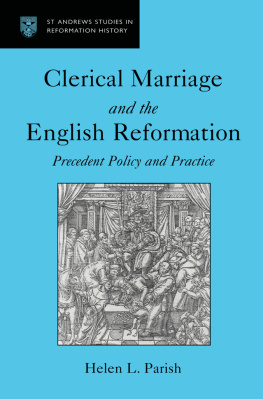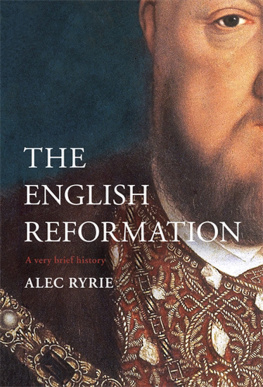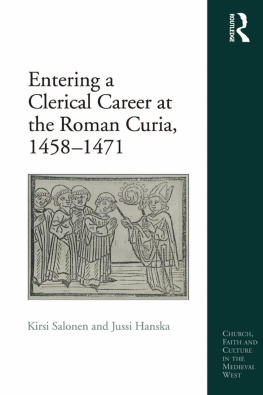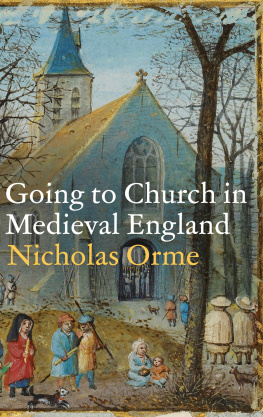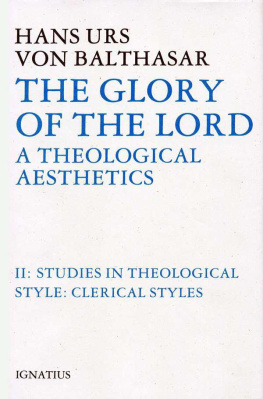Clerical Marriage and the English Reformation
Clerical Marriage and the English Reformation
Precedent Policy and Practice
Helen L. Parish
First published 2000 by Ashgate Publishing
Published 2017 by Routledge
2 Park Square, Milton Park, Abingdon, Oxon OX14 4RN
711 Third Avenue, New York, NY 10017, USA
Routledge is an imprint of the Taylor & Francis Group, an informa business
Copyright Helen L. Parish, 2000
The author has asserted her moral right under the Copyright, Designs and Patents Act, 1988, to be identified as the author of this work.
All rights reserved. No part of this book may be reprinted or reproduced or utilised in any form or by any electronic, mechanical, or other means, now known or hereafter invented, including photocopying and recording, or in any information storage or retrieval system, without permission in writing from the publishers.
Notice:
Product or corporate names may be trademarks or registered trademarks, and are used only for identification and explanation without intent to infringe.
British Library Cataloguing in Publication Data
Parish, Helen L.
Clerical Marriage and the English Reformation: Precedent Policy and Practice.
(St Andrews Studies in Reformation History)
1. Catholic ChurchClergyFamily relationships.
2. ReformationEngland.
I. Title.
253.2'09031
Library of Congress Cataloging-in-Publication Data
Parish, Helen L.
Clerical marriage and the English Reformation: precedent policy and practice/Helen L. Parish.
p. cm. (St Andrews Studies in Reformation History)
Includes bibliographical references and index.
ISBN 0754600386 (alk. paper)
1. ReformationEngland. 2. EnglandChurch history16th century. 3. ClergyFamily relationships. 4. MarriageHistory16th century. 5. CelibacyHistory16th century. I. Title. II. Series.
BR377.H37 2000
253'.25'094209031dc21
0020648
ISBN 13: 978-0-7546-0038-1 (hbk)
Typeset in Sabon by Express Typesetters, Farnham, Surrey
St Andrews Studies in Reformation History
Editorial Board: Bruce Gordon, Andrew Pettegree and John Guy, St Andrews Reformation Studies Institute, Amy Nelson Burnett, University of Nebraska at Lincoln, Euan Cameron, University of Newcastle upon Tyne and Kaspar von Greyerz, University of Basel
The Shaping of a Community: The Rise and Reformation of the English Parish c. 1400-1560
Beat Kmin
Seminary or University? The Genevan Academy and Reformed Higher Education, 1560-1620
Karin Maag
Marian Protestantism: Six Studies
Andrew Pettegree
Protestant History and Identity in Sixteenth-Century Europe
(2 volumes) edited by Bruce Gordon
Antifraternalism and Anticlericalism in the German Reformation: Johann Eberlin von Gnzburg and the Campaign against the Friars
Geoffrey Dipple
Reformations Old and New: Essays on the Socio-Economic Impact of Religious Change c. 1470-1630
edited by Beat Kumin
Piety and the People: Religious Printing in French, 1511-1551
Francis . Higman
The Reformation in Eastern and Central Europe
edited by Karin Maag
John Foxe and the English Reformation
edited by David Loades
The Reformation and the Book
Jean-Franois Gilmont, edited and translated by Karin Maag
The Magnificent Ride: The First Reformation in Hussite Bohemia
Thomas A. Fudge
Kepler's Tbingen: Stimulus to a Theological Mathematics
Charlotte Methuen
'Practical Divinity': The Works and Life of Revd Richard Greenham
Kenneth L. Parker and Eric J. Carlson
Belief and Practice in Reformation England: A Tribute to Patrick Collinson by his Students
edited by Susan Wabuda and Caroline Litzenberger
Frontiers of the Reformation: Dissidence and Orthodoxy in Sixteenth-Century Europe
Auke Jelsma
The Jacobean Kirk, 1567-1625: Sovereignty, Polity and Liturgy
Alan R. MacDonald
John Knox and the British Reformations
edited by Roger A. Mason
The Education of a Christian Society: Humanism and the Reformation in Britain and the Netherlands
edited by . Scott Amos, Andrew Pettegree and Henk van Nierop
Brief Chronicles and True Accounts: Tudor Histories of the English Reformations , 1530-83
Thomas Betteridge
Poor Relief and Protestantism: The Evolution of Social Welfare in Sixteenth-Century Emden
Timothy G. Fehler
Radical Reformation Studies: Essays presented to James M. Stayer
edited by Werner O. Packull and Geoffrey L. Dipple
There is a history in all men's lives,
Figuring the nature of the times deceased.
William Shakespeare, Henry IV, Part II (1597), Act 3, Scene 1
History never looks like history when you are living through it. It always looks confusing and messy and it always feels uncomfortable.
John W. Gardner
At times the sixteenth century can seem no less confusing and messy for those who write about it than it was for those who lived through it. As those who made the Reformation sought to understand the events of the past and the present, those who were affected by religious and political change saw the securities of the mediaeval past subside, and watched the collapse of the certainties of daily life. Few groups were as susceptible to the changing fortunes of the Reformation in England as the clergy. The sacraments which underpinned the nature and function of the priesthood were redefined, and messages preached from the pulpit were subjected to the vagaries of political change and doctrinal debate. Priests who had made a perpetual promise of celibacy were granted the freedom to marry, only to find that freedom revoked four years later. Clerical marriage was a highly visible sign of religious revolution, and the changing demands of legislation on the subject led to disruption and dislocation on a national scale. In the course of researching and writing the history of clerical marriage during the Reformation, it is impossible to ignore the polemical passions and personal struggles which governed thought and action, and which brought the issue to the fore.
The debate on clerical marriage in the sixteenth century encompassed almost every major theme in Reformation controversy, and sheds light upon the nature and motivations behind religious change. Biblical and patristic texts became the language of debate, records of past centuries were plundered, and the present became a hunting ground for those who sought to convince or convert. However, the certainties of polemical debate were not always borne out by events in the parishes, and image and reality in the English Reformation did not always coincide. The response of the clergy to legislation that attempted to control their public and private lives gives some indication of the struggle which faced those who sought to capture hearts and minds, and suggests a variety of influences which may have governed individual reactions to religious change. As a result, a study of clerical marriage in England is also a study of questions of authority, the place of history, and the understanding of the nature of the church and its sacraments. Against the reformation demanded by polemicists stands the reformation enacted by church and state and the reformation accepted, rejected or ignored by the laity and the clergy. Confronted with this multiplicity of opinion, action and reaction, it is the task of the historian to 'figure the nature of the times deceased'.

